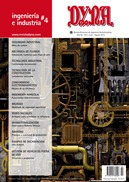THREE-DIMENSIONAL MODELING OF SURFACE ROUGHNESS FOR BURNISHING PROCESS
Keywords:
Proceso de bruñido, rugosidad superficial, distribución normal, acabado superficial, modelado de rugosidad, Burnishing process, Surface roughness, Normal distribution, Finishing, Modeling roughness.Abstract
Ball burnishing is a plastic deformation process that improves the surface quality of mechanical parts decreasing roughness. The surface roughness is an important parameter of study; it is known that affects friction, lubrication and wear. In this work, a general methodology for finite element and a programming routine based on Parametric Design Language was developed and validated. This methodology is useful to generate parametric models of three-dimensional rough surfaces in a commercial software of finite element. The routine produces a random surface roughness using the mean (x ?) and standard deviation (s) of a normal distribution of real surface roughness. The routine was used to generate roughness models of rectangular and cylindrical specimens. The nodal density for generating roughness and repeatability for a given surface finish were evaluated to optimize the modeled surface roughness. The numerical results show a good correlation to the experimental results. In a future, the routine can be used to generate models through the finite element method to simulate any machining process with random roughness and this enable to study the processes, allowing reducing the high costs of experimental tests.Downloads
Published
2015-07-01
Issue
Section
ARTICULOS

